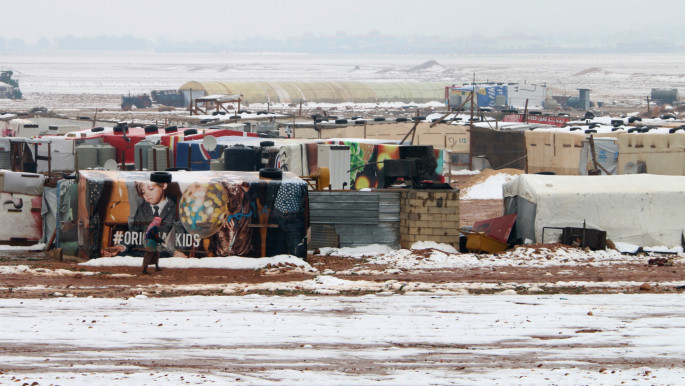Heavy storm devastates Syrian refugee camps in Lebanon
Women waded knee-deep in muddy water to move around. Others pumped water out of flimsy tents that left mattresses soaked and destroyed foodstuffs and furniture.
A five-day storm that battered Lebanon with heavy rain and snow has had a devastating effect on thousands of refugees living in tents dotting eastern Lebanon's Bekaa valley, displacing many whose shelters were either flooded or destroyed by snow.
"I lost everything inside," said Umm Fawaz standing outside her tent with water up to her knees. She said she had to sleep for five nights on a chair because of the water.
The UN refugee agency said on Thursday that 361 sites that are home to some 11,000 Syrians have been affected.
The storm compounds the already miserable conditions of refugee life in Lebanon, which houses the highest percentage of refugees in the world with nearly 1 million, or about a quarter of the country's population.
The storm that ended on Wednesday caused widespread damage in Lebanon, where overflowing rivers killed an 8-year-old Syrian girl and damaged scores of cars and homes.
Mountain roads were cut off by heavy snow and power outages were common.
 |
| The storm compounds the already miserable conditions of refugee life in Lebanon [AFP] |
On Thursday, refugee Alaa Shehadeh, 31, cleaned his tent where he lives with his wife and five children after knee-high water was sucked out by a giant tanker. All the food he had stored inside the tent as well as mattresses and blankets were damaged.
The settlement where he lives in Bar Elias is on the edge of the Litani River, which flooded during the storm and is home to some 420 refugees, including 100 children. On the first day of the storm, people fled from one tent to another as the water began to rise.
|
"Only God's mercy can save us," said Shehadeh, whose wife and children fled during the storm to a hall in a nearby building that they now share with dozens others forced out of the settlement.
In other settlements nearby, water was half a meter (yard) high and some residents used floating pieces of wood as boats to move from one place to another. Children in flip flops waded through the freezing water.
On Thursday, volunteers pumped water from refugee settlements and distributed rubber boots, blankets and winter clothes to refugees needing help.
The storm disrupted schooling for many refugees but amid the misery there was a success story: Some schools had units known as Ghata - Arabic for cover - that weathered the storm. Ghata units are the result of a project spearheaded by the American University of Beirut and Education Above All Foundation that helps improve education for vulnerable and marginalised people.
The 20-square-meter (215-square-foot) units that can be assembled by two people in six hours rely on low-cost materials easily found in a local marketplace.
The units can then be disassembled in less than three hours for reassembly elsewhere at a later date.
The units can withstand severe weather and have a lifespan of between 10 to 15 years. To date, 10 portable school campuses located within refugee settlements have been assembled, serving around 5,000 students annually.
Some of these units were used as shelters by refugees during the storm, while in others classes went on as usual because they were on higher ground and the walls don't leak water.
English teacher Nahida Nuseir held a 9th-grade class that was attended by nearly 30 female Syrian students.
"If we had tents we will not be able to give them school because as you know all the tents here in the country were destroyed by the storm," she said.
"Thank God we didn't have any problems during storms," said school principal Samar Jumruk.



